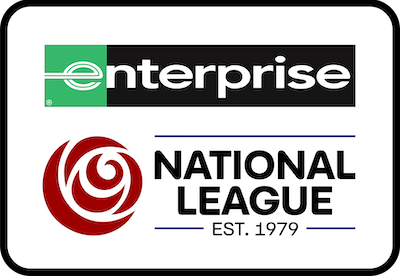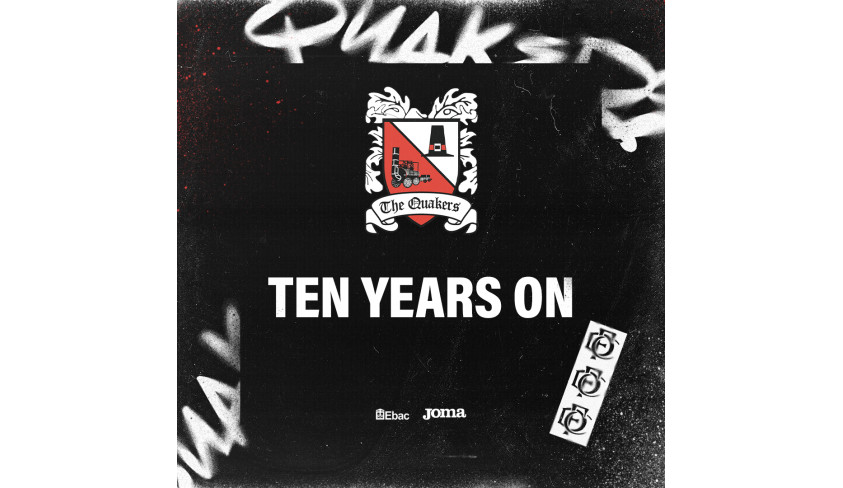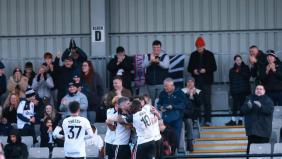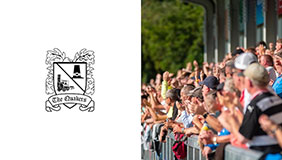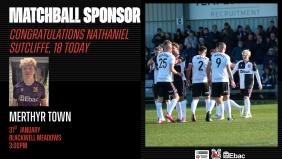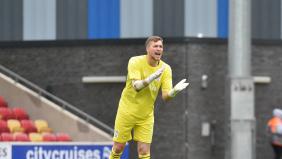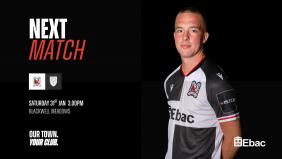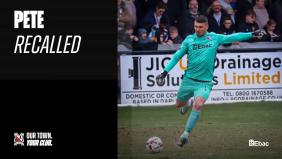More memories of famous events
Ten years ago, the club almost went out of existence, and here, courtesy of the "In the Dying Seconds" book, is an account of events by the late Harvey Madden, the administrator who agreed to save the club, and to whom we'll always be grateful.
Harvey Madden – “The club finally got to me”
I received a call at home on December 27th from Darlington director Andy Wilson, whom I knew from his days at the NatWest Bank, the day after Darlington played at Gateshead. I met him and Raj at Raj’s house and discussed the situation for two hours before I left. They wanted to put the club into administration during the following two days, but I wanted to wait until after New Year’s Day.
I knew that the club was in a perilous state from press reports and it didn’t surprise me that I got the call to come in and be the club’s administrator.
I agreed to start the job on January 3rd because I didn’t want to disrupt the team’s preparations for the New Year’s Day game against Gateshead, plus from a personal point of view I wanted to enjoy the Christmas holiday instead of having to start work on an administration! I also didn’t want the publicity of my appointment to affect the gate, although there was already plenty of speculation.
The papers were formally signed on January 3rd the day after the Bank Holiday. One of my first jobs was to meet manager Craig Liddle and his players and to be fair, the reaction to my appointment was fairly good overall, although one or two players had grumbles. However, another early job was to speak to the staff and unfortunately I had to let a lot of them go.
I gathered them all in a room, and told them that because I had very little money at all, I would only be keeping on four people full time – Craig Liddle, Colin Galloway, Jason Lees and Brian Douglass plus some part timers. They were all key to me with defined responsibilities.
Andrew Thompson – Tommo – came to see me and offered to work for nothing. I knew Tommo from my cricketing days and I was delighted that he came back. People like him really lifted me; they were prepared to work for nothing simply because they loved the club. I was delighted he made the offer, the same as Dave Eckels, the groundsman who also agreed to reduce his hours to cut costs.
It was gut-wrenching telling all these people that they weren’t needed any more. I didn’t like doing it, but it needed to be done because the club just couldn’t afford to keep them on. As soon as I told the ones that weren’t required, the room fell quiet and in those circumstances, it’s best to disappear.
I seriously began to think that Barrow could be the club’s last game unless a buyer came forward. I hardly had any cash at all to play with – the only money was from the Gateshead home game on New Year’s Day - but on the other hand I was optimistic that I could find a buyer for the club.
But there was a problem as far as the cash was concerned. I was appointed on January 3rd, the Barrow game was January 7th, but there was no home game scheduled until January 21st, because January 14th was free as our scheduled opponents were in the FA Trophy that day. So there was no revenue coming in for a long period and all I had were the gate receipts from the Gateshead game. I reckoned that I could only keep the club going for a fortnight, until January 18th at the very latest.
So unless somebody or something materialised, then the Barrow away game was looking more and more as if it would be the last for the club. Some players hadn’t been paid at all previously, but others, who were seen to be saleable assets like Liam Hatch and Jamie Chandler, had been paid on time as per the terms of their contract.
Gateshead FC made an offer of £5,000 for the pair. I decided to accept the offer because they would pay straight away and I agreed with the players after some discussion that they could play the last game at Barrow before moving. Jamie in particular didn’t want to go and insisted that he played at Barrow before going to Gateshead.
My top priority was to keep the club alive, because there was still the possibility that I could find a buyer. The publicity surrounding the club was a big help in trying to find a buyer – I didn’t need to buy much advertising space. There seemed to be constant media attention, which in some ways was helpful. I got mobile calls from reporters all the time and in the end, I asked them to lay off me, and that in return I would keep them in touch with what was going on. Some media outlets respected that viewpoint, such as BBC Tees, the Evening Gazette and the Northern Echo. Maybe there were no other big sports events going on at the time, such as the Champions League or an England international, which is how we gained so much coverage.
Two people from the Rescue Group, Steve Weeks and Mark Meynell, came forward. They were very keen, they didn’t have much collateral, but they said that they would work hard to try and find a buyer.
I had some absolute time wasters on the phone to me. One in particular said that even though he had no money, he would take the club over. Those people were filtered out by my insistence that any potential buyers had to provide proof of funding.
But overall, the biggest problem for the club was that it didn’t own the stadium and when some potential buyers discovered that fact, then they pulled out and they all just about dwindled away.
So on the morning of Wednesday January 18th having received no firm offers and with no potential buyers on the horizon, plus I was on the deadline for adopting the players’ contracts; very reluctantly I took the decision to close the club.
I knew there were a lot of fans and media outside, so there would be quite a lot of exposure for my decision. On my way into the stadium, I was approached by one reporter and I tried to stay positive, but it was difficult.
So just before midday and with still no contact forthcoming from any potential saviours, I asked Craig Liddle and the rest of the staff for a meeting and I told them that in the circumstances, I had no alternative other than to close the club. They were stunned, naturally. I then asked Craig to accompany me to meet the players and inform them.
In my professional career as an administrator, I am used to situations in which I’d delivered bad news to people about their jobs, but this was different. I was conscious of the effect it would have not just on the club’s employees but also on thousands of people.
I tried to keep my composure as I walked into the meeting room. I looked at the faces of the players, some of them looking at me in hope, others in despair.
I started to read my prepared statement, but found it difficult in the circumstances. At one point I had to stop talking due to the emotion. Darlington Football Club had finally got to me! I didn’t want to close the club because it was against my principles, but I found it difficult to carry out the dreaded task.
I apologised to the players, managed to pull myself together, and completed my statement. There was stunned silence and after a couple of questions, I left the room. It’s best to leave quickly in those circumstances and let people digest the news.
After a few minutes, Colin Galloway found me and told me that there were some people outside the stadium, banging on the window and saying that they had the money. I went to the door - it was Doug Embleton and Shaun Campbell from the Rescue Group, frantically waving a briefcase around with a curious crowd behind them jostling for a good view. I told Colin to let them in and I invited them into my office, along with Steve Weeks and Karen Glencross, who had also arrived, albeit with much less fanfare.
The four of them said they had the money that would allow the club to trade until the end of January and they wanted to formulate an offer. I asked them how they would find the money; they gave me a few details, so after taking them into consideration, I said I wouldn’t close the club just yet.
Music to my ears! I went back into the meeting room and told the players that everything I’d just said was on hold and that I was going to a meeting at a secret location – which everyone knew was the Blackwell Grange Hotel. There was a reaction of disbelief from the players, who had started to remove the pictures and paintings from the walls. There was a chance that the club could live.
Off we went to the Blackwell Grange Hotel. So much for it being a secret location – the press were all there waiting for me! I gave them a quick update on my way into a meeting with the Rescue Group.
I had a big round the table meeting with all the people in there and told them that they had to produce the money in the next few hours and that that I wouldn’t work on promises. People darted in and out of the meeting raising the cash and making frantic phone calls and eventually they raised just over £50,000. It was an amazing effort and I really admired them for it. They proved that they really loved their club enough to such a degree that they would go to any lengths to stop it from closing.
Satisfied that the Rescue Group had raised the money I needed to keep the club going, I went back to the Arena to inform Craig Liddle and the players.
They were as amazed to hear the good news as they were depressed to hear the bad news a couple of hours previously. But one person who said he’d had enough was Aaron Brown, who was determined to return to his home in the west country and said that he wouldn’t play for the club again. However, two days later, he returned to the club and changed his mind. He came to see me and we accepted him back – I was grateful, because by then, we were left with literally the bare bones.
I worked very closely with Craig Liddle and the pair of us were very determined to field a team, no matter how strong or weak it was. We were equally determined to get through to the end of the season and if we were forced to field several youth team players, then we would. It was essential that we fulfilled our fixtures.
We now prepared for the much needed home games against Fleetwood and York City and thanks to all the publicity generated by the media, we had a huge crowd for both games. Fortunately the weather was kind. The turnout was unbelievable and I was delighted for everyone concerned. Both crowds were over 5,000 and that provided enough revenue to just about see us through the next few weeks.
We had offers of help from all over the place, even from our neighbours at Hartlepool. Even though there is supposed to be keen rivalry between the clubs, they kindly offered to lend us a grasscutter when ours broke down.
The chairman of the Conference, Dennis Strudwick, attended the home game against Fleetwood. He sat with me in the directors’ box and I found him a helpful and amenable chap, but his hands were tied by the Conference rules. Even though Craig could get players for nothing – like Adam Boyd from Hartlepool – the Conference wouldn’t allow us to sign them because they were too good!
We were allowed though to sign former Darlington player Neil Wainwright. Carol Charlton introduced me to him after the Fleetwood game and he offered to come and play for the club. I spoke to Craig and he was delighted that a senior player was going to return. The Conference didn’t raise any objections, probably because he’d just recovered from an injury and wasn’t fully match fit. He went on to do a good job for us.
We managed to bring in Drewe Broughton nearer the end of the season, again because he was a free agent. He gave us a presence up front and took some of the pressure off Ryan Bowman, who was our only recognised forward.
We also signed a young keeper called Jordan Pickford from Sunderland. He was young and inexperienced, but possessed huge amounts of enthusiasm. He said that he would do a job for us and wouldn’t let us down – he certainly didn’t. He had a great attitude, which I thought was fantastic – typical of all the players that we managed to bring in.
It’s ironic and contradictory, but there were occasions when we didn’t want certain players to turn out for us, in case we incurred extra costs. We closely monitored the appearances of certain players in case they triggered a bonus clause or a new contract, something that we could in no way afford. So they were either “injured” or put on the bench without any intention of putting them on the field.
I had to keep the running costs well under control. One overhead that certainly needed controlling was the water bill of around £5,000 per month. I couldn’t work out why it was that much, because I couldn’t see where the consumption was going to. We looked for all sorts of reasons, but couldn’t find anything. There must have been a few leaks somewhere.
Unfortunately, crowds dwindled as the season went on, especially on Tuesdays because of the competition from television football, but the hard core of around 1,300 fans continued to come to games, even though there was a good chance that we would lose the game. Again, Darlo fans proved how much they loved their club.
I was confident that the Rescue Group would persevere, because they possessed a huge amount of enthusiasm and hard work and were all genuine people who wanted the club to continue. People like Laura Drew and Karen Glencross came across as very confident that they could raise the money to buy the club. I had a gut feeling that the Rescue Group could do it. We kept in regular contact, mainly by e mail. I rarely met them face to face, but I gave them what help and expertise I could. They were their own masters.
While Dennis Strudwick from the Conference was brilliant throughout, the same couldn’t be said about the FA. I found them very difficult to deal with and whenever I tried to contact somebody, I received an air of “It’s you again, is it?” They didn’t give me straight answers to my questions and nobody would make a decision. Maybe three administrations counted against the club, who knows.
Certainly, I didn’t think the club would be relegated all the way down to the Northern League, it seemed very severe and didn’t make sense to me. And to take the Darlington name away as well was ridiculous.
I thought I was well received by 95 per cent of fans. I had the odd person haranguing me, but I could deal with that. I was there to do a job to the best of my ability and I think everyone respected that. I made a deliberate decision to go to every home game, to oversee operations and be in the middle of it all. If people wanted to speak to me, then I would do so because I was keen to keep everyone onside.
Soon after, the Rescue Group and I agreed a deal for the club, which was effectively the badge, brand, goodwill and fixtures and fittings. The club had to move away from the Arena, there was no way it could continue to exist there with the restrictions and the huge overheads.
Denis Pinnegar had taken over as chairman. I’d known Denis for many years and one day he told me that he would like to meet the Rescue Group. Before I knew it, he’d been made chairman!
I was very, very proud of the Darlo players, for the way they kept plugging away in many games, and equally very proud of the Darlo fans, for sticking behind their team and raising the money to buy the club. I think everyone got their reward when we reached the end of the season and beat Kettering in the last game.



